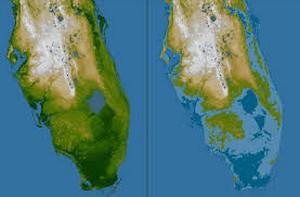Climate threatsStern warning: Climate expert emphasizes the fierce urgency of now
Prominent economist and policymaker Lord Nicholas Stern delivered a strong warning about the dangers of climate change in a talk at MIT on Tuesday, calling the near future “defining” and urging a rapid overhaul of the economy to reach net zero carbon emissions. “The next 20 years will be absolutely defining,” Stern told the audience, saying they “will shape what kind of future people your age will have.”

Impression of Florida after rise of sea height // Source: jpl.nasa.gov
Prominent economist and policymaker Lord Nicholas Stern delivered a strong warning about the dangers of climate change in a talk at MIT on Tuesday, calling the near future “defining” and urging a rapid overhaul of the economy to reach net zero carbon emissions. “The next 20 years will be absolutely defining,” Stern told the audience, saying they “will shape what kind of future people your age will have.”
“Don’t underestimate the size of the challenge,” Stern added, while giving the MIT Undergraduate Economics Association’s annual public lecture.
To consider the climate trouble we are already in, Stern noted, consider that the concentration of carbon dioxide in the atmosphere is now over 400 parts per million, a level the Earth has not experienced for about 3 million years, long before people were around. (The modern human lineage is estimated to be about 200,000 years old.)
Back then, sea levels were about 30 to 60 feet higher than they are now, Stern said. The recent rise in carbon dioxide concentrations has created rapidly increasing temperatures that could raise the ocean back to those pre-human levels — which would profoundly alter our civilization’s geography.
“It would be Oxford-by-the-Sea,” Stern said, referring to the English university seat that lies about 50 miles inland at present. “Bangladesh would be completely underwater.” Moreover, Stern noted, “Southern Europe would probably look like the Sahara Desert.”
And with a 2 degree Celsius rise in average temperatures, Stern pointed out, the proportion of people on Earth exposed to extreme heat would jump from 14 percent to 37 percent.
“This is the kind of heat that can kill, in a big way,” Stern warned.
“Net zero is fundamental”
As dire as those scenarios seem, Stern also expressed some optimism, saying that policymakers are now much more likely to believe that we can combine continued economic growth with zero-emissions technology — a change from common views expressed at, say, the 2009 global climate summit in Copenhagen.
“What we’ve seen I think in the last five years or so is a change of understanding of the policy toward climate change,” Stern said, “from ‘How much growth do we have to give up to be more responsible and sustainable?’ to ‘How can we find a form of growth that’s different and sustainable?’”
